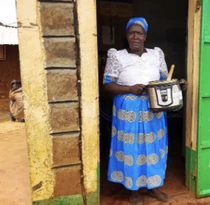|
Last edited: 3 October 2016
|
 Presentation Movie SolSuffit Sol Suffit introduced the SolarCooker Eco3 in Senegal in 2011. |
Events
Featured international events
- 4-6 June 2024 (Bridgetown, Barbados): Sustainable Energy for All Global Forum - The event will be co-hosted by Sustainable Energy for All (SEforALL) and the government of Barbados. It is a platform for government, business and finance leaders, entrepreneurs, and youth and community representatives from around the world to come together to broker new partnerships, spur new investment, and address challenges at the nexus of energy, climate, and development. More information...
Online events
- NEW: Thursday, 18 April 2024 (2:30pm-3:15pm EDT), (Washington, D.C., USA): ESMAP Spring Meetings Knowledge Café: Clean Cooking at the Heart of Energy Access - Join ESMAP for this exciting knowledge-sharing opportunity, which will showcase the role of clean cooking as a key part of energy access and energy transition. Presentations by René van Hell, Director of Inclusive Growth, Ministry of Foreign Affair, Netherlands, Dr. Kandeh Yumkella Chairman, Presidential Initiative on Climate, Renewable Energy and Food Security, Sierra Leone, and Chandrasekar Govindarajalu, Practice Manager, ESMAP, World Bank. In-person attendance at World Bank Atrium, MC Front Lobby is for Spring Meetings registrants only. However, you can watch the event online
Requests for proposal
- Decentralized Renewable Energy Solutions utilizing Solar and Bio-Energy - Sustainable Energy Technologies and Assessments of ScienceDirect, is requesting guest-author submissions. The special issue, VSI: DRES is devoted to publishing research articles reporting the innovative designs and design interventions in solar thermal and bio-energy for decentralized energy systems (DES). It includes i) new and novel designs of prototype or commercial devices and technologies, their development, modeling and simulations and experimental validation; ii) innovations for processes, techniques, utilization, and applications; iii) novel use of materials for improving efficiency, performance, techno-economic feasibility, and sustainability and iv) research findings addressing the socio-economic, health and safety impacts, and life cycle assessments leading to proposing novel devices for DES. The Deadline for submission is 31 July 2024. More submittal information...
- See also: Global Calendar of Events and past events in Senegal
News
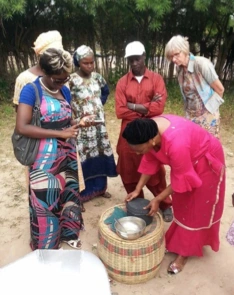
Fatim Diaw, KoZon's representative in Senegal explains how to use a hay basket.
- October 2016: Pilot project in Diouloulou, South Senegal - In Casamance, the southernmost region of Senegal, a solar cooking pilot project has been launched with assistance from Solar Cooking KoZon. CooKit and hay basket demonstrations were conducted and received with such enthusiasm that a local core group has begun production of the solar panel cookers and hay baskets for marketing in Diouloulou and neighbouring villages.
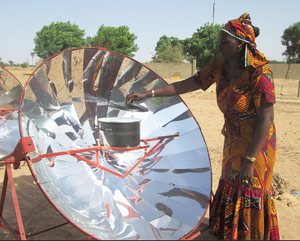
Sun and Ice has opened an integrated cooking workshop in Senegal.
- March 2016: Senegal receives an integrated cooking facility with help from Sun and Ice - Stephan Zech reports that Sun and Ice has sponsored a facility in Senegal that is promoting solar cooking, heat retention cooking, and fuel-efficeint stove use. More information...
- January 2016: Senegal Turning 14,000 Villages Into Ecovillages - Valhalla
- August 2014: UNHCR recruiting Senior Energy Officer for Senegal - Read more...
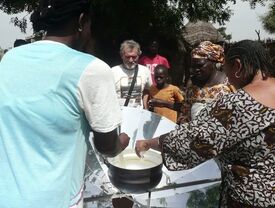
Cooking the first solar cooked meal in Sessene, Senegal.
- November 2013: Cucinare con il Sole is a volunteer organization founded in 2006 by Ottorino Saccon, a teacher and craftsman, based in Santa Lucia di Piave TV, Italy. They produce parabolic solar cookers in Italy, and have been introducing solar cooking to villages throughout central Africa, making 3-4 trips to Africa each year. They have worked with over thirty groups in workshops with typically 10 - 20 participants. At Sessene, fifteen kilometers from the city of Thies in Senegal, villagers assemble their first solar cooker. Soon after, in the shade of a baobab mother, they share a meal of cooked rice and vegetables.
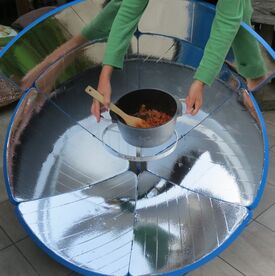
SolarCooker Eco3 new cookpot support
- January 2013: Improvements to the SolarCooker Eco3 - Significant improvements have been made to the SolarCooker Eco3 over the past six months. The cookpot holder will now carry up to 7 kg. (15.4 lbs.) of weight. The reflector support has been modifeid to allow it to position the reflector for nearly perpendicular sun positions. The cooker is now able to boil six liters of water with a reflecting surface of only 1.25 square meters. Evaluation of the earlier solar cooking project in Senegal has begun. Early impressions appear to reinforce the need for long-term education and the continued local presence of dedicated trainers. A new pilot project has started in another area of Senegal, near St Louis in the "Langue de Barbarie". About 250 solar cookers were to be introduced by the end of 2012 (after the rainy season). A second new solar cooking project is underway in Mauritania with the financial support of the United Nations. Read more at Solar Cooking NV Fall 2012 update
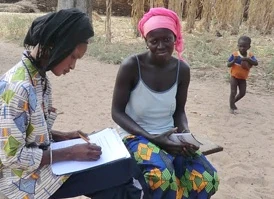
Wilma Goppel of the KoZon Foundation interviews local women in Senegal to tailor a solar cooking program to their needs.
- March 2013: First KoZon-SPS solar cooking project in Senegal - Wilma Goppel, project coordinator for the KoZon Foundation, began demonstrating solar cooking technology in December to the women in Ndondol and staff of Caritas using the CooKit solar panel cooker. The local women were excited that now the first KoZon solar cooking project in Senegal is underway. The contracts between the Foundation for Rural Senegal (SPS), the Foundation KoZon and Caritas Senegal have been finalized. KoZon was not previously active in Senegal. At the request of the Foundation for Rural Senegal (SPS) and Caritas Thies in Senegal, Wilma first traveled to Senegal in late November. She wanted to first gauge the interest in the use of solar cooking in the rural municipality Ndondol, and learn about local cooking habits and fuel consumption. Read more: First KoZon-SPS solar cooking project in Senegal - (English version)
- November 2012: GloboSol annual report: Senegal - Solar ovens at the school of Malicounda - This year Ursina von Albertini, the manager for the GloboSol project, abstained from her yearly visit in February and March. The reason for this was the election of the President, which had engendered fears of violent unrest. In addition, a visit did not seem urgent. Growing from a solid base, the project in the village of Malicounda, Senegal, has developed and grown on its own initiative. Healthy food cooked in five solar ovens is distributed once a week to children and elderly residents. Also, a village shop for solar products like marmalade, syrup, bakers ware, soap and cleanser will be opening soon. In the neighbouring village of Mbour a second interested group of about twenty women was founded using a similar educational program. These women as well, are learning with diligence and enthusiasm.
History
Considerable activity is present in Senegal on the solar cooking front. Much of that can be credited to the work of Abdoulaye Toure, a former teacher in the nation and now a government official, responsible for work in the renewable energy field. He serves as the executive of a national commission, and has direct contact with the President of the country who is so enthusiastic about the potential of solar cooking that he seconded Mr. Toure to the Ministry of Education to pursue this work. Prior to taking this position, Mr. Toure worked on solar cooking when he could, outside of his work hours as an elementary principal, in the construction and promotion of solar ovens. In his present position, he has created a substantial amount of publicity and activities, including television shows, visits to neighboring countries to extend the technology beyond Senegal's border, and numerous demonstrations and training courses all over the country. He is well known as the most ardent developer of solar energy, and is sometime dubbed in Senegal as "Mr. Sun."
One example of this work can be seen in the village of Diaganiao, a rural community with 6,000 inhabitants. It hosts several solar cooking projects, including a workshop that produces solar ovens for sale. As always, the problem with box cookers is the high cost to ordinary citizens, which has meant a slow uptake of the technology. Experimentation is ongoing with larger devices, to meet the needs of larger families, and less expensive devices as well.
In his most recent report to the President of the Republic, Mr. Toure elaborates on his work. He clearly is a dedicated person and a dreamer, now in a position of more influence, making him optimistic for the future of his cause, In his words " When one dreams alone, it is only a dream. When one dreams with many, it is the beginning of reality". To that end, an organization called Friends of the Sun was instituted in 2002. Senegal also was the first African nation to join the Global Ecovillage Network (GEN), a feat recognized in the Johannesburg Social Development meetings. They are (partnering with counterparts in a Chinese Network to transfer reforestation technology. Similarly, they partner with an American network on technical issues.
The activities of the association revolve around two major projects: the African Solar Cooker Project (PCSA) in partnership with French groups, and the GEN network, mentioned above. A large number of individual projects have been established in the country, as well, in many parts of the country, in over 35 communities. One major operation is called the Palette Project, with an educational focus. An American group that has been generous in providing resources to schools finances this activity. Mr. Toure sees this as critical for developing a creative spirit in the communities where they work. One problem badly needing a creative solution concerns the mangrove swamps that line the Senegalese coast. Mangroves are being cut and burned to smoke fish for commercial sale, thus leading to serious erosion, as well as destruction offish habitat (a problem not unique to Senegal). He believes that solar energy can play a role in solving this problem, by providing alternative energy for the fish-smoking process. The work of Senegal's Mr. Sun has been known in the solar cooking world for some time, despite communication issues for monolingual English speakers. All who know him are delighted that he is currently in a position where his vast knowledge and long lasting dedication to solar cooking can be placed efficiently in the service of that cause in his country and the region. Most noteworthy is the strong and continuing commitment of the government of Senegal to this work.
Remains of other projects are also found, some no longer in use. One example was seen in a dispensary in the town of Niaming which had a solar photovoltaic panel, used for sterilization of medical equipment. It was however not in use, with local medical personnel preferring to use an electrical sterilizer, even though the costs were very high. The solar version was slow to heat up and less convenient than the electric version, which had been locally built and government subsidized at a cost of around 380 Euros (Trip Report, M. Bonello, 2003).
Also World Vision Mali had promoted distribution of about 105 cookers in Senegal as of 2004.
[Information for this section was taken originally from State of the Art of Solar Cooking by Dr. Barbara Knudson]
- Main article: History of solar cooking
Archived articles
Climate and culture
In February 2009, Solar Household Energy reported, "The main reason we are very interested in solar box ovens is that for rural families in West Africa the HotPot is too small; box cookers can be made large enough to feed rural families (women usually have to cook for 10 or more people at a time). In Senegal there is a heritage of metal and wood workers which makes it a prime spot for box cooker production."
See also
- The climate of Senegal - Wikipedia
- Discussion of northern Africa's suitability for solar cooking
- Solar cooker dissemination and cultural variables
- Solar cooking for large groups
Resources
Possible funding
- Find a Kiva microfinance partner in Senegal.
- Raising funds through grants and donations]
- Senegal Ecovillage Microfinance Fund (SEM)
Reports and evaluations
- 2014: The Mekhe Solar Cooker: Empowering Women One Community at a Time - A Case Study - SGP The GEF Small Grants Programme
- March 2013: Eerste KoZon-SPS zonnekookproject in Senegal - KoZon
Discussion groups
Articles in the media
- January 2016: Senegal Turning 14,000 Villages Into Ecovillages - Valhalla
- November 2009: New mobile solar bakery benefits the population of Méouane, Senegal - Agence de Presse Sénégalaise
- November 2008: SENEGAL: Weighing the benefits of solar stoves - Reuters
External links
Audio and video
- January 2012:
Presentation Movie SolSuffit
Sol Suffit introduces the SolarCooker Eco3 in Senegal in 2011.
- April 2010:
- May 2008:
Contacts
The entities listed below are either based in Senegal, or have established solar cooking projects there:
SCI Associates
- Main article: Solar Cookers International Association


